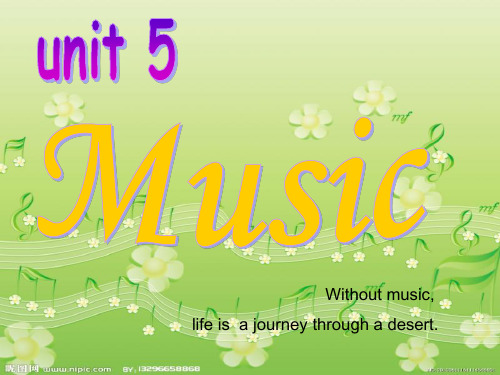2015-2016学年河北省新乐市第一中学高中英语必修2课件Unit 5 Music Reading.ppt
- 格式:ppt
- 大小:1.17 MB
- 文档页数:20
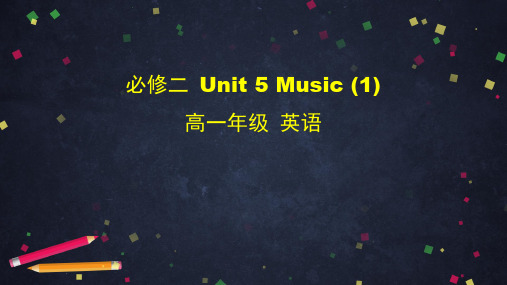
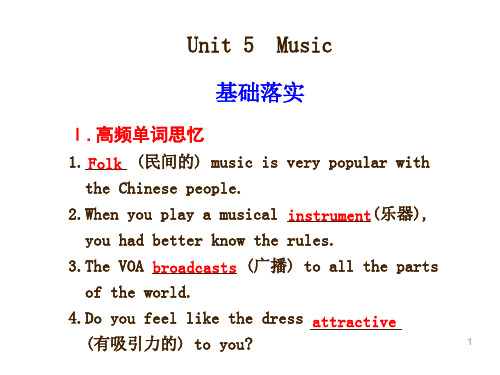

![河北省新乐市第一中学高中英语必修2课件:Unit 5 Music[单元课件]](https://img.taocdn.com/s1/m/a072b69884868762caaed519.png)


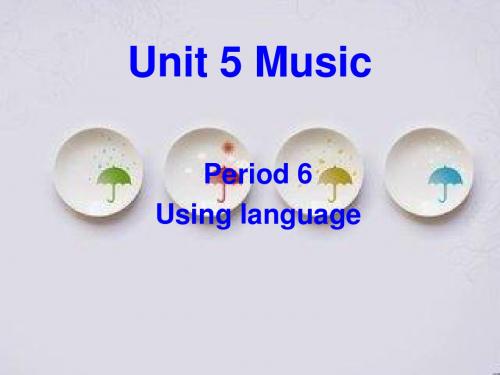
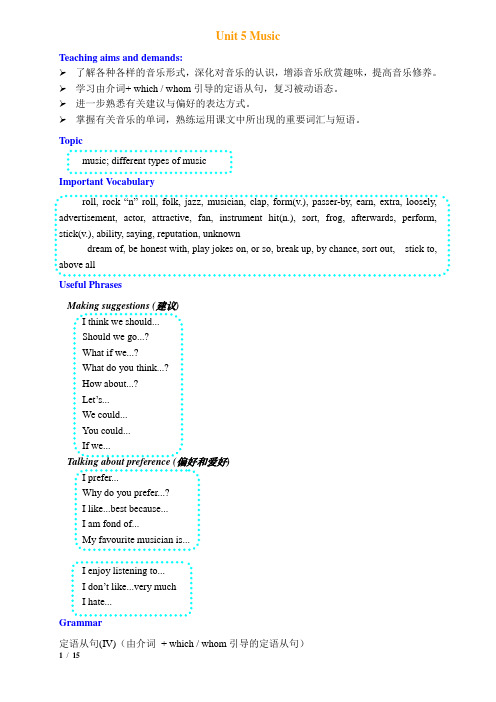
Unit 5 MusicTeaching aims and demands:➢了解各种各样的音乐形式,深化对音乐的认识,增添音乐欣赏趣味,提高音乐修养。
➢学习由介词+ which / whom引导的定语从句,复习被动语态。
➢进一步熟悉有关建议与偏好的表达方式。
➢掌握有关音乐的单词,熟练运用课文中所出现的重要词汇与短语。
Topicmusic; different types of musicImportant Vocabularyroll, rock “n”roll, folk, jazz, musician, clap, form(v.), passer-by, earn, extra, loosely, advertisement, actor, attractive, fan, instrument hit(n.), sort, frog, afterwards, perform, stick(v.), ability, saying, reputation, unknowndream of, be honest with, play jokes on, or so, break up, by chance, sort out,stick to, above allUseful PhrasesMaking suggestions (建议)I think we should...Should we go...?What if we...?What do you think...?How about...?Let’s...We could...You could...If we...Talking about preference (偏好和爱好)I prefer...Why do you prefer...?I like...best because...I am fond of...My favourite musician is...I enjoy listening to...I don’t like...very muchI hate...Grammar定语从句(IV)(由介词+ which / whom引导的定语从句)The musicians of whom the band was formed played jokes on each other as well as played music.However, after a year or so in which they became more serious about their work, “The Monkees” started to play their own records and started touring and write their own songs like a real band.Period One Warming up and ReadingTeaching objectives:1. Enable students to talk about different kinds of music.2. Understand the text and do comprehending exercises.3. Learn the important words: folk, jazz, musician, clap, form, passer-by, earn, extra, loosely, advertisement, actor, attractive, fan, instrument, hit.4. Learn to use the expressions: dream of, be honest with, play jokes on, break up.Important and difficult points:1. U nderstand the text and talk about music and the band “The Monkees”.2. How to use the following expressions: dream of doing, be honest with somebody, play a joke on somebody, break up.Teaching procedures:Step 1. Warming upGood morning, Class. Today we are going to talk about an interesting topic —music. As we know, music is a kind of art of making pleasing combinations of sounds in rhythm, harmony and counterpoint. Music can produce a lively and happy atmosphere and bring people relaxation after hard work, which can reduce the tiredness. Listening to music also makes people feel happy and nice. How many kinds of music are you familiar with? Can you tell me about the different kinds of music? Now turn to Page 33, look at the pictures, read the captions and listen to the different kinds of music. See if you can guess which music matches with which picture.Step 2. Pre-reading1. Thinking and sayingHave you heard about any of the famous bands in the world? List some if you can.For reference: I’ve heard about “The Beatles”, “Back Street Boys”, “The Eagles”, “West life” and “Pink Floyd”.2. Listening, talking and sharing◆Let’s listen to some pieces of music from different bands. Work in groups of four.Tell your group mates which band you like best. Why? Then the group leader is to stand up and share the group idea with the class.For reference: I am from Group 1. O ur group like “The Beatles” best. We like their style of performances. Listening to their performances, we will feel relaxed, amused, and their performances make us think a lot about life.◆Do you know anything about “The Monkees”?For reference: “The Monkees” is a band that was the first popular in the 1960s in America. Unlike most bands of the time, the Monkees were not formed by its members but rather by TV producers. They were a fictional band in the TV show of the same name. The band was composed of Mike Nesmith, Mickey Dolenz, Davy Jones, and Peter Tork. All the members had some musical experience. Let’s come to the reading —THE BAND THAT WASN’T and find more about them.Step 3. Reading1. Reading aloud to the recordingNow please listen and read aloud to the recording of the text THE BAND THAT WASN’T. Pay attention to the pronunciation of each word and the pauses within each sentence. I will play the tape twice and you shall read aloud twice, too. Turn to page35 then join the correct parts of the sentences together.2. Reading and underliningNext you are to read and underline all the useful expressions or collocations in the passage. Copy them to your notebook after class as homework.Phases reference:dream of doing, at a concert, with sb. clapping and enjoying…, sing karaoke, be honest with oneself, get to form a band, high school students, practise one’s music, play to passers-by, in the subway, earn some extra money, begin as a TV show, play jokes on…, be based loosely on…, the TV organizers, ma ke good music, put an advertisement in a newspaper, look for rock musicians, pretend to do sth., the attractive performances, be copied by…, support them fiercely, become more serious about…, play their own instruments, produce one’s own records, start touring, break up, in the mid-1980s, a celebration of one’s time as a real band 3. Reading to identify the topic sentence of each paragraph.Skim the text and identify the topic sentence of each paragraph. You may find it either at the beginning, the middle or the end of the paragraph.1st paragraph: How do people get to form a band?2nd paragraph: Most musicians meet and form a band.3rd paragraph: One band started as a TV show.4th paragraph: “The Monkees” became even more popular than “The Beatles”.4. Reading and understanding difficult sentences.As you have read the text times, you can surely tell which sentences are difficult to understand. Now put your questions concerning the difficult points to me.5. Choose the adjectives that you think best describe “The Monkees”. Have a class discussion to see if you all agree. Give your reasons for your choices.The important thing is to encourage your students to examine all the alternatives offered and accept or reject them with a reason.Step 4. Useful vocabularyAsk the students to look for the words and expressions and see if they understand them well. Give explanations to show how to use them.1. match①与……相配vi./vt.e.g. Your dress and your shoes match perfectly.The shoes will match your dress. (go with)② vt. be equal to 与……相匹敌,与……势均力敌e.g. No one can match her at chess.n. ①相匹配的人、物a match for sb./sth.e.g. The shoes are a good match for your dress.②(与某人)相匹敌的对手e.g. She’s my match when it comes to chess.(i.e. as good as or better than me…)2. dream of / about sth., sb./(doing) sth.dream+从句向往,梦想;梦见e.g. He often dreams of being a scientist.The soldier often dreamed of his hometown.I would not /never dream of…3. with + 宾语+ 宾补常见形式如下: with + 名词/代词+ 形容词with + 名词/代词+ 副词with + 名词/代词+ doingwith + 名词/代词+ to do (表要执行的动作)with + 名词/代词+ done (表动作的完成及被动)with + 名词/代词+ 介词…, with everyone clapping and enjoying your singing?Example:◆The old man sits on the chair, with his dog lying beside him. (躺在他身边)◆With tears in her eyes, she left the room.(眼含泪水)◆The old musician fell asleep with the window open.(开着窗子)◆It was a pity that the great writer died with his work unfinished. (工作未完成)◆With production up by 60% (生产提高了60%) the company has had anotherexcellent year. 原因状语◆With the final exams to worry about, I have to work really hard this month. 原因状语◆With a lot of difficult problems to settle, the newly-elected president is having a hardtime. 要执行的动作Practice:◆She always sleeps with the light on.◆The teacher entered the classroom with a book on his hand.◆With China entering the WTO, we are facing more challenges.◆With her work finished, she listened to some music to have a rest.4. honest adj. 诚实的dishonest adj.不诚实的honesty n. 诚实,忠实be honest with sb.:tell exactly what one thinksbe honest in (doing) sth.说实话,我认为他们没有获胜的机会。
![河北省新乐市第一中学高中英语必修2课件:Unit 5 Music[综合课件]](https://img.taocdn.com/s1/m/89d0aea765ce0508763213bc.png)

